The return to classes will look different this year at the University of Virginia School of Law, and faculty and administrators are preparing for a semester unlike any other.
Due to the ongoing COVID-19 pandemic, the school will offer a mix of in-person and online courses. First-year students are scheduled to start courses Aug. 19, and second- and third-year students will begin classes a week later, as usual, on Aug. 26. Any student who wants to take a class, or all their classes, remotely can choose to do so.
Offering these options required reworking the usual curriculum and school operations.
“This pandemic poses unprecedented challenges in the history of the Law School, and we are working hard to meet the moment,” said Dean Risa Goluboff. “Throughout the summer, our faculty and staff showed incredible creativity and flexibility as they adapted our operations in accordance with public health guidelines, prepared our facilities for a safe and healthy return to classes, and remodeled our curricular schedule to account for a hybrid learning environment.”
In preparing for the return to Grounds, UVA recently announced a detailed public health plan, including requiring returning students to be tested for COVID-19, and other protocols and practices for testing, monitoring and quarantining, including a daily symptom reporting app, HOOS Health Check, for students and employees. Face coverings are required within buildings, including the Law School, though teachers may remove masks to teach when plexiglass is present. Additional information, including updated FAQs regarding the University’s ongoing response to the coronavirus pandemic, can be found at UVA’s Return to Grounds site and on the Law School site.
At UVA Law, about 50% of courses have an in-person option, though the course schedule may evolve as adjustments are made due to enrollment data. The school is offering 175 courses, in line with past semesters.
First-year students, who are divided into small sections of 35-38 students to build camaraderie with classmates, will have two classes with their small section this fall instead of just one. Orientation will largely take place online via Zoom, but students will be able to meet their small-section classmates and Peer Advisors, who help guide new students through their initial year in law school, in person at orientation.
“There’s no doubt this year will feel different, but we are focused on the health and safety of our students, the UVA Law community and the greater community beyond these halls,” Assistant Dean for Student Affairs Sarah Davies ’91 said. “We are counting on students to work together and work with us to ensure the best learning environment possible under the circumstances.”
For courses that take place in person, students will sit at least 6 feet apart, sometimes in event spaces such as Caplin Auditorium, Caplin Pavilion and the Purcell Reading Room, as well as the school’s existing larger classrooms. Large tents with lighting have been erected outdoors in Spies Garden to give students and others more room to engage in activities at a safe social distance.
“We are fortunate to have these large spaces, and a temperate climate, to allow us to continue to gather in classes and as a community,” Vice Dean Leslie Kendrick ’06 said. “We are also outfitting classes with new equipment to facilitate online instruction, including plexiglass at podiums, web cameras and multiple monitors.”
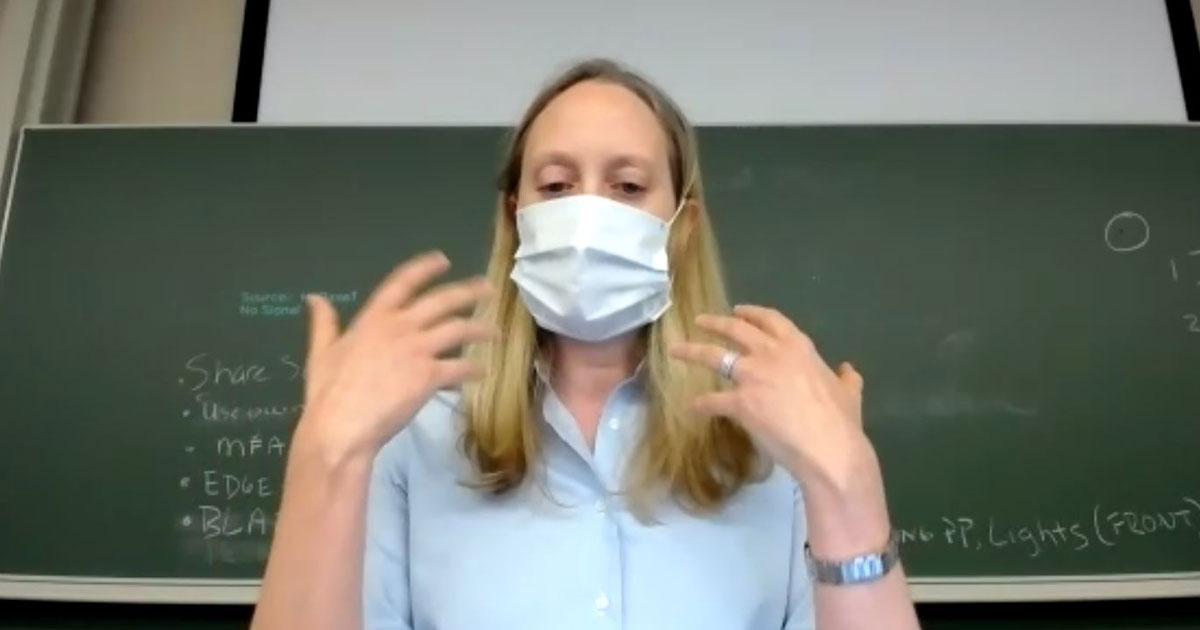 Vice Dean Leslie Kendrick demonstrates for faculty via Zoom what students taking a course remotely see under different conditions, including when the professor wears a mask.
Vice Dean Leslie Kendrick demonstrates for faculty via Zoom what students taking a course remotely see under different conditions, including when the professor wears a mask.
Caplin Pavilion has been carpeted to improve sound quality for students participating remotely, and will feature new chairs with desks spaced out for students to take courses there. The library has also installed plexiglass to allow two students to study safely at a desk. Approximately 200 hand sanitizer and wipe dispenser stations have been placed throughout the school, and toilets are being equipped with lids that close. While most sink faucets in the school are touchless, those that are not are in the process of being converted.
“It takes substantial resources to make all of these changes in preparation for conducting classes in a hybrid format and ensuring a safe return for the community,” said Senior Associate Dean for Administration Stephen Parr. “It has also required a monumental effort by staff, working nonstop throughout the summer, to prepare to reopen the school.”
Much of the Law School’s life moved online March 19 when students returned after spring break to online-only courses, in line with higher education institutions across the country. Shifting to a hybrid model this fall involves fashioning solutions to new questions, from how to encourage students to follow best public health practices to how to allow students to safely exit from classrooms (the new schedule allows 20 minutes between classes, versus 10 in previous years).
Though life at the Law School will resume, staffing will be reduced inside the building, and some employees will work remotely at least some of the time. Students will continue to meet online or over the phone with career counselors, admissions and financial aid officials, and Student Affairs staff, among others. Faculty office hours will take place online. Events will continue to be virtual, and University policy limits social gatherings to no more than 15 people. The school will offer the same dining services to students, though the buffet in Stone Dining Room will be closed in accordance with Virginia Department of Health policy. The library will be open from 8 a.m. to 5 p.m. Monday through Friday, and the school is asking Law School community members to leave the building by 9 p.m. to allow for more cleaning. The facility’s doors will be locked around the clock, and Law community members should keep an ID card on hand to access the building.
To provide students with additional space to take classes online or study, eight seminar rooms on the first floor of Withers-Brown Hall and one seminar room and two jury rooms on the second floor of Slaughter Hall will be available.
Students are finding ways to work within the constraints of their new environment and take advantage of the upsides of Zoom-centric events. Student Bar Association President Katharine Janes ’21 said student organizations have been hosting a number of online activities — including an SBA trivia night and a Black Law Students Association speaker series — that have flourished this summer, when typically there are no events.
“I wouldn’t be surprised if attendance at events is higher over Zoom since people are still equally interested in engaging with our Law School community,” Janes said. “It’s such a large part of who we are and what we do.”
She added that at an American Bar Association meeting she attended over the summer with student leaders from across the country, participants were struggling with the same issues concerning building a sense of community over distance.
“This is such new territory for everyone,” she said, “but I know 2Ls and 3Ls are invested in trying to impart the culture of UVA to our incoming 1Ls.”
Even though the school, students and employees are adapting to a new reality, Goluboff acknowledged that the months ahead will require resilience and may involve adjustments as conditions evolve. She said it’s understandable to be disappointed at losing some of the usual hallmarks of a typical school year.
“Keeping our distance isn’t going to be easy in a community known for being close, but it is necessary to reduce risks and promote our health,” she said. “Our students’ fortitude and patience will continue to play a critical role in our continued success.”
One of the areas of Law School life most affected by the pandemic is the Graduate Studies Program. Though the program usually includes 45-50 LL.M. candidates, and about 10-20 S.J.D. candidates, most of whom are from other countries, there will be fewer such students this year. For reasons outside of the Law School’s control, international students were unable to obtain visas required to travel to the United States and study.
“Most of our admitted students have deferred, but we will have a small group of LL.M. students attend both online and in person this year as well. Our S.J.D. candidates were already in the country, so the S.J.D. class was not affected by the issues that impacted the LL.M. students,” Assistant Dean for Graduate Studies Adriana Vito said. “I look forward to supporting them, and I expect we will have a very robust class next year once students can travel and the worst of the pandemic is behind us.”
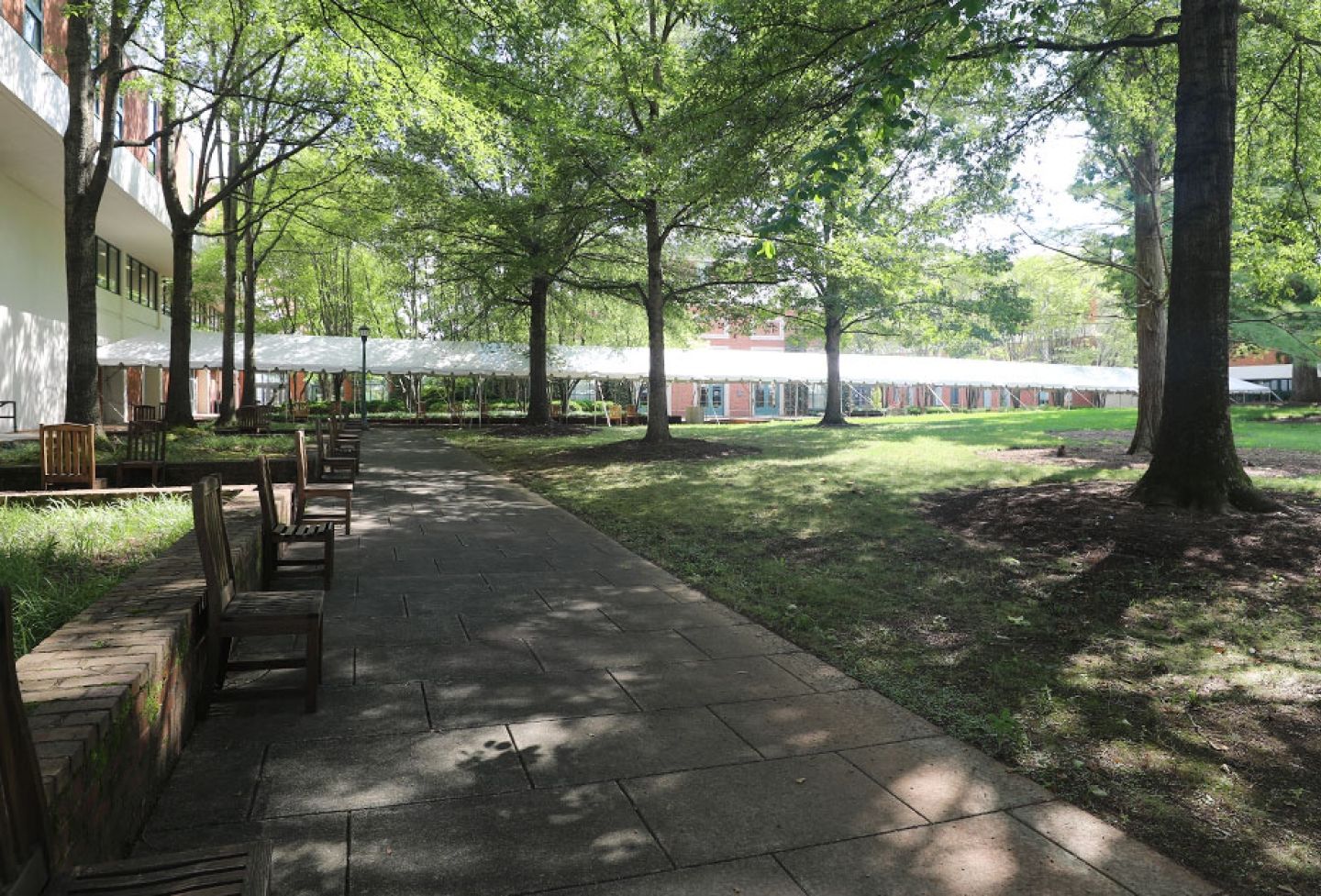
A tent from Withers-Brown Hall to Slaughter Hall allows students an additional outdoor hallway to travel between buildings. Other tents also make outdoor activities more convenient.
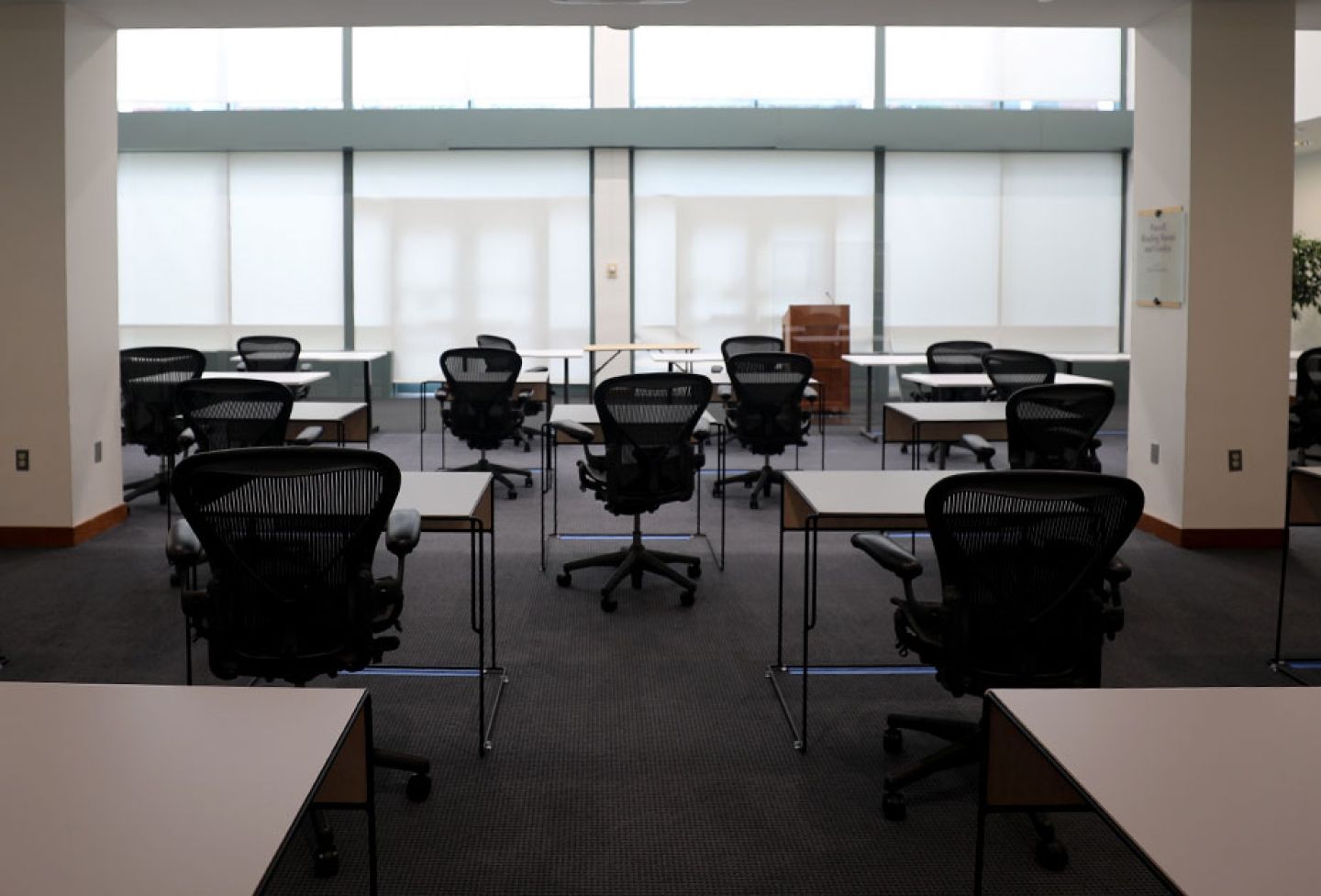
Normally an event and study space, the Purcell Reading Room will serve as a classroom this semester.
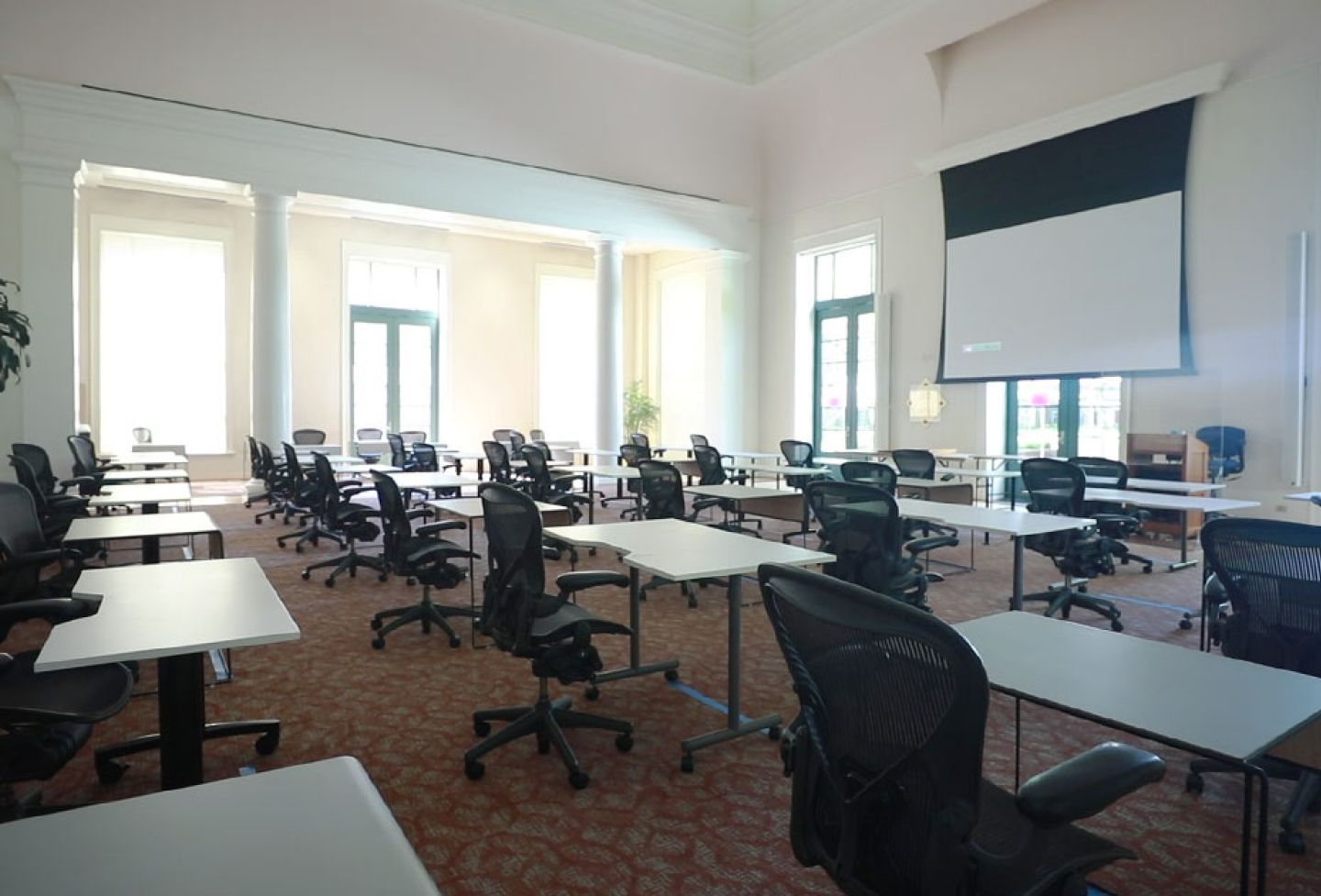
Caplin Pavilion also will serve as a classroom this fall.
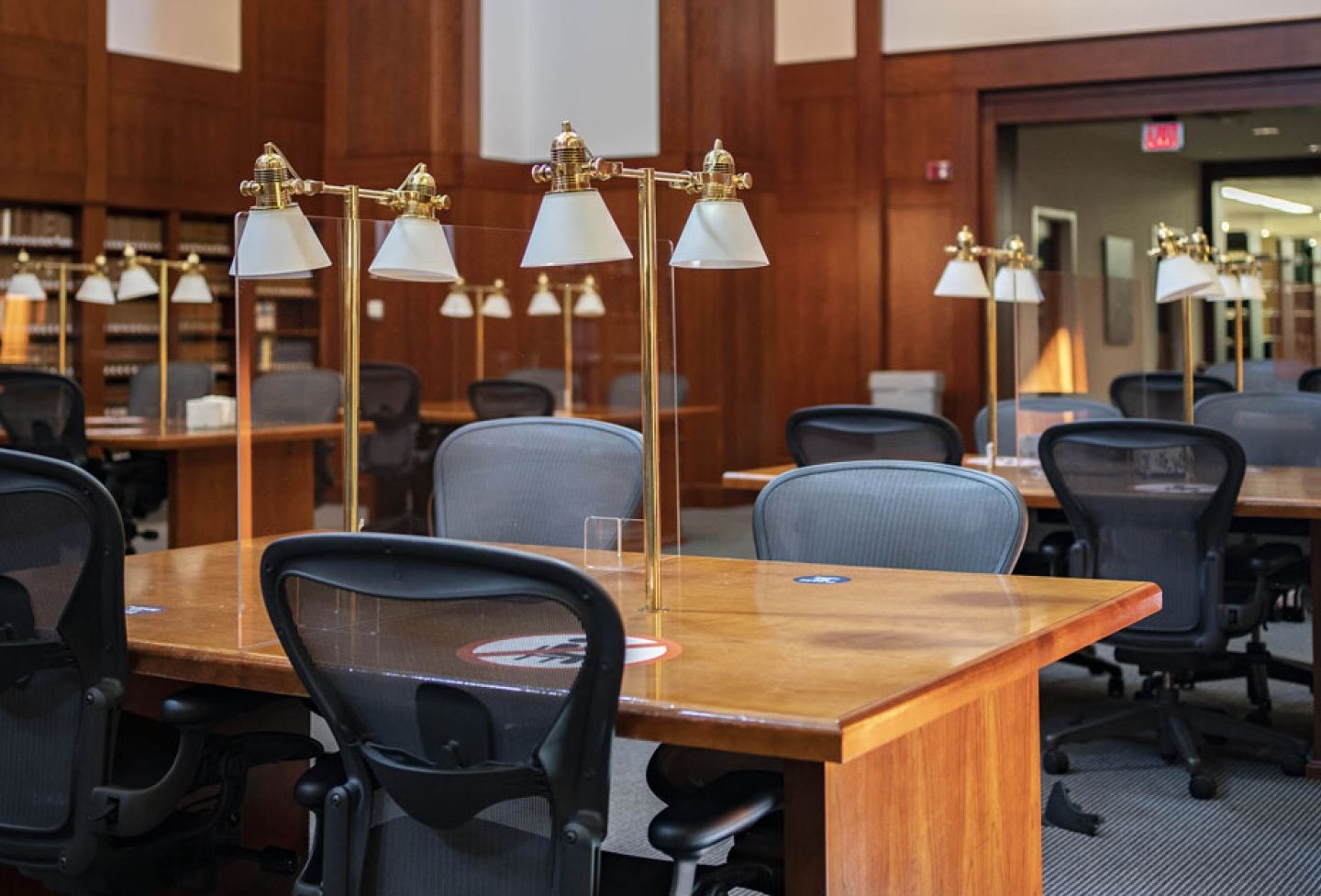
Plexiglass divides tables in the Law Library so two students can study at each table.
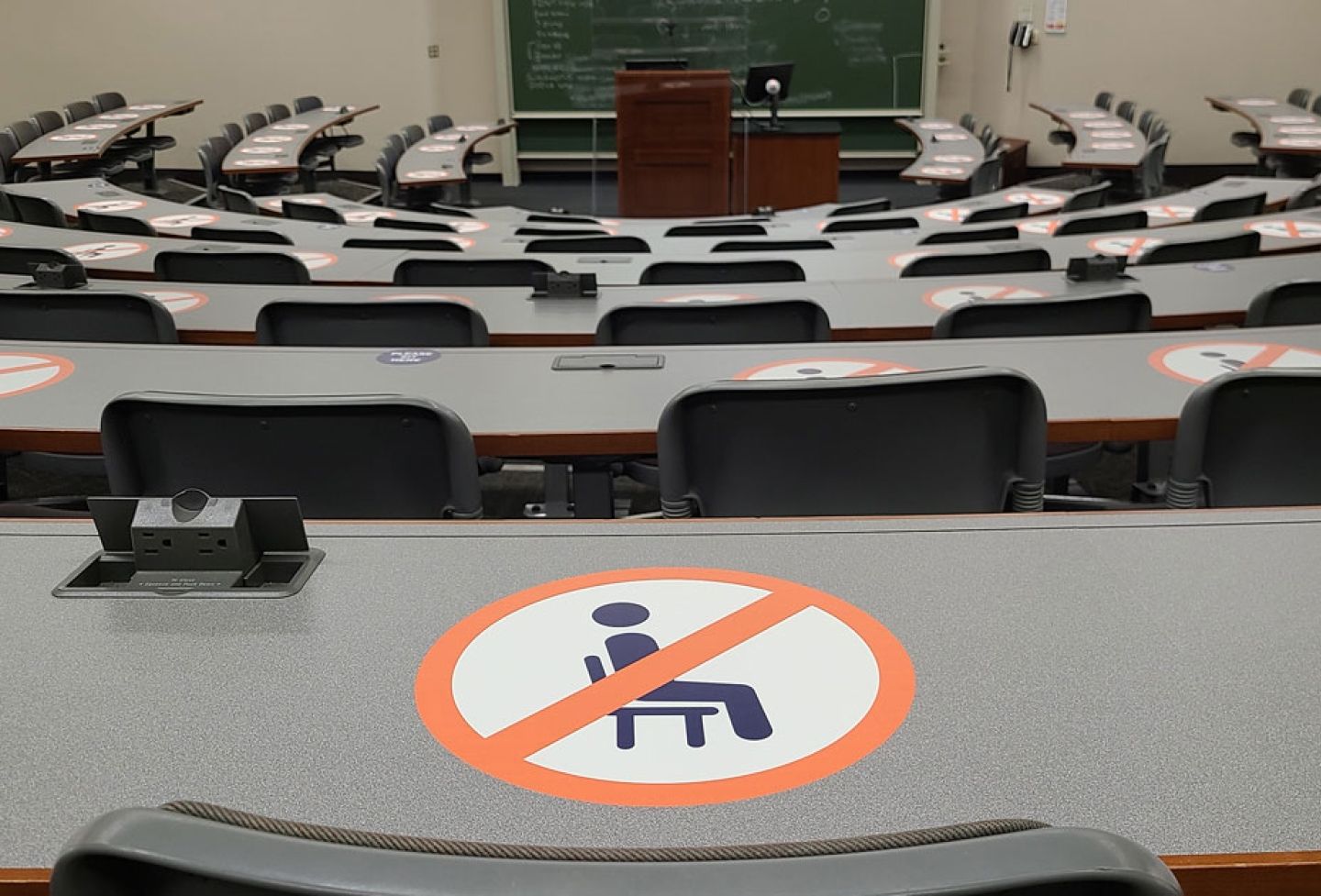
Stickers in classrooms show students where to sit in order to be 6 feet apart. A classroom that typically holds about 150 students now seats 35.
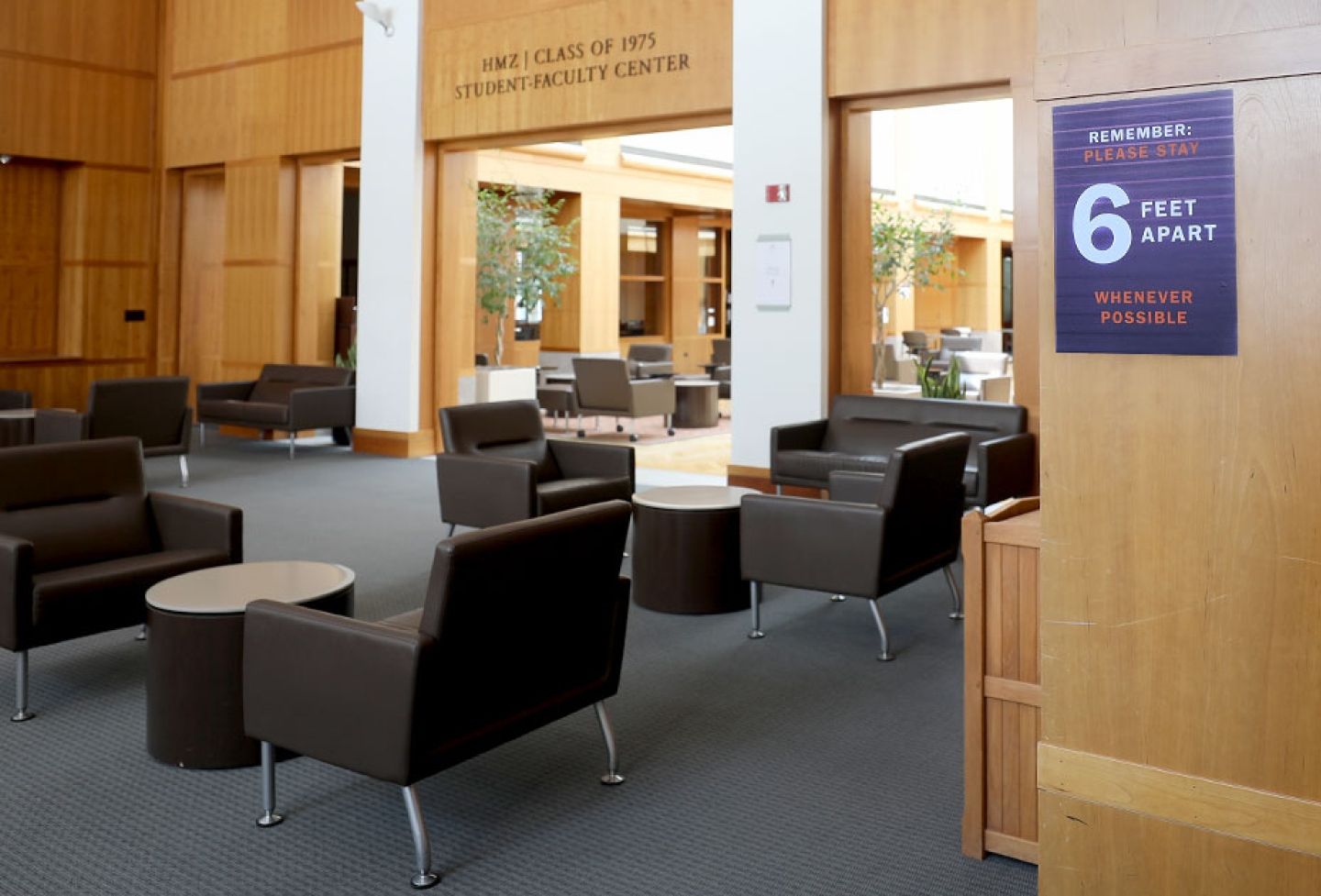
Seating in Scott Commons is now situated 6 feet apart.
Founded in 1819, the University of Virginia School of Law is the second-oldest continuously operating law school in the nation. Consistently ranked among the top law schools, Virginia is a world-renowned training ground for distinguished lawyers and public servants, instilling in them a commitment to leadership, integrity and community service.


